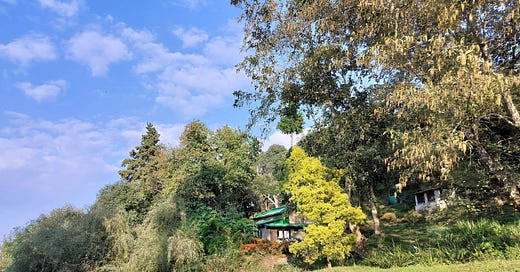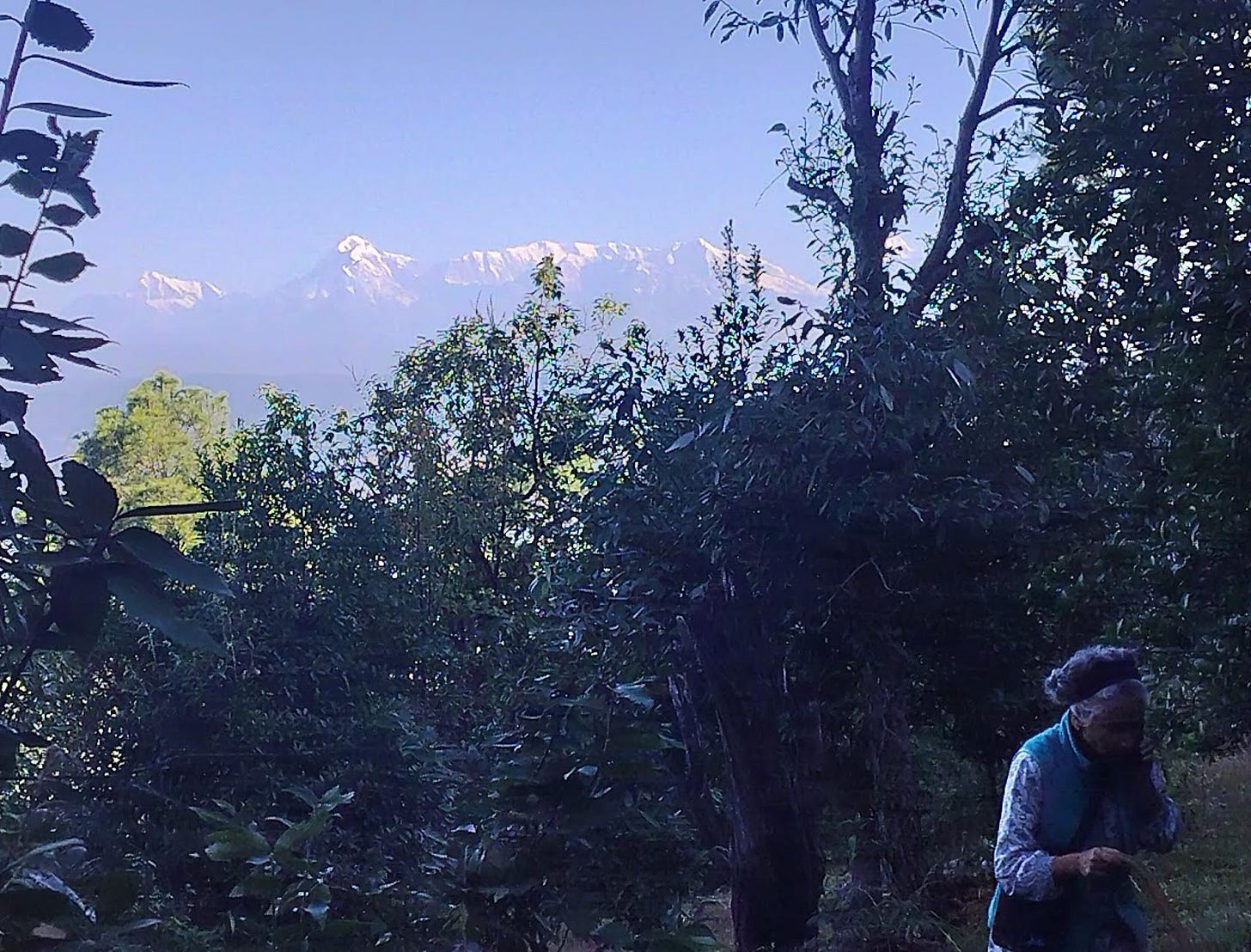Old Home
The rain is cold, the steep paths through the forest narrow and slippery. You lean into the task of getting home, find energy in the prospect of shedding your squelching shoes and your damp clothes, of settling before the fire with a hot cup of tea.
In the forest, home is refuge in a primitive way, the way of survival. The elements surround you in a way the city obscures. One April afternoon, we watched a black cloud blot our view of Trishul, adding masses of vapour as it rolled towards us, implacable and insistent as a tidal wave, roiling over ridges, shrouding valley upon valley, blanketing Almora, then breaking upon us with with a clatter of hailstones that drew on a store of unending treasure, millions of glistening, mis-shapen marbles that tumbled into the gutters, battered the narcissi and the stray daffodils, carpeted our lawn with cold playthings that Mallika gathered in a mug and brought in for Kedar’s delight.
One winter evening, we bathed the infant Kedar in a basin in front of the fire. Corky was restless, whining in a register we had never known. We heard a patter outside, then the low sawing of a leopard. Up and down it passed behind our curtains, drawn against the mountain cold. Two moments of silence passed, then it leapt on our tin roof. One thundering bound, and it was gone, gone from our refuge.
Two nights ago, I woke at three a.m., to the waning moon peeping through the skylight above me. “Oh, I’ll get someone to help us shut it tonight”, Premila said when I told her over our morning coffee. By no means, I insisted. There was such joy in saying hello to my visitor, so quiet in her arrival, so gracious in her departure.
Some twenty years ago, Premila had other visitors in the dark of night - visions of rowhouses peeping down on our backyard, the towering utees trees and gnarled oaks of our hillside replaced by clotheslines and transistor radios. Her nightmares were contagious, and I would see myself climbing darkly from the road into a grid of squalid homes I didn’t know. Where was our garden? I panicked before I woke, where was the deodar we planted when Premi first visited this home, four months before we were wed?
Last week, on the twenty-eighth anniversary of our wedding, we walked into the reality of these developments, a scant kilometer from us. Clustered above the tight curves of steeply winding roads newly hacked into the hillside, buttressed by massive embankments, a self-assured colony of luxury homes, gazing upon Trishul and Nanda Devi from behind towering sheets of plate glass. Suburban strips of grass decorated with new transplants from thriving nurseries.
But I get ahead of myself, and of the brokers who moved into our hillside two decades ago, digging out records of owners who had long abandoned this village. Yes, the brokers would drive the urbanisation of our village, I acknowledged Premila’s worst fears. But their only currency was - well - currency, and we would have to find some to fund a different version of the future. Over the next several years, every time some savings showed up in our bank accounts, we bought whatever land was on offer, one naali* just beyond our fence, two naalis that we had thought we owned, and in one giant leap of hope, eleven naalis that lay on the other side of a patch of land under family dispute.
“You’ll never be able to buy that land”, our broker cautioned us. But seven years later, he crested our slope with a smile and a crumpled series of documents: “I’ve got all fifteen family members to sign off on the sale.”
When we returned from our anniversary walk three days ago, it was through this patchwork of purchases, of nightmares yielding to hope, of thirteen different transactions, thirteen trips to the grotty Registrar’s Court in Nainital, now manifesting in a little forest that we encouraged. That’s all that we humans can claim, a little encouragement for nature. Nature reasserts itself, when mankind yields.
I saw that in the clarity of a dive in tropical seas when I descended to a wreck at twenty meters. In every crevice of a once mighty ocean-going ship, the sea had planted its flags, seaweed that beckoned in flourishes, a tiny colony of crustaceans in the rim of a porthole, parrotfish that swam proudly through the remains of a galley.
In the stout finger of land that extends south and west from our garden, fresh green oaks have sprung from darkened stumps, maples grow from seeds blown by the wind, rhododendrons blossom in the early spring, and fungi mushroom in the monsoon. Blessed by a phone call from my eldest cousin, it was in this little forest that we marked our anniversary.
The forest that is our refuge, above the home that always was.
New Forest
A naali is the local measure of land, roughly two hundred square meters.
Three Thinkers
who deeply moved me this last week:
Bertrand Russell, The Sceptical Essays
The value of psychoanalysis as a tool for mental health has gone through cycles of acceptance and dismissal. Today, it feels like everyone I know is seeing a therapist. Writing almost a century ago, Bertrand Russell averred that the world would be a lot better off if powerful people had therapy. Psychoanalysis, or similar methods, he said,
can cure the irrationalities of those who are not recognised lunatics, provided they will submit to treatment by a practitioner free from their delusions. Presidents, Cabinet Ministers, and other Eminent Persons, however, seldom fulfil this condition, and therefore remain uncured.Ta-Nehisi Coates, The Gigantic Dream
In the third essay of his new book, The Message, Ta-Nehisi Coates writes of two Israelis who took him around Jerusalem and the West Bank, Avner and Guy:
They were raised under the story that the Jewish people were the ultimate victims of history. But they had been confronted with an incredible truth - that there was no ultimate victim, that victims and victimisers were ever flowing.When victims acquire power, but still see themselves as victims, they create space to legitimise of every kind of barbarism.
Roger Waters, Amused to Death
Once of the iconic band Pink Floyd, Roger Waters produced the album, Amused to Death, partly as a reaction to the First Gulf War. In the track, What God Wants, Part I, a child’s voice says,
I don’t mind about the war. That’s one of the things I like to watch - ‘Cos then I know if our side’s winning, if our side’s losing.In the song Watching TV, Roger Waters reminds us that these are real people on the screen,
In Tianmen Square
Lost my baby there
My yellow rose
In her bloodstained clothes…
She had perfect breasts
She had high hopes
She had almond eyes
She had yellow thighs
She was a student of philosophy
Won’t you grieve with me
For my yellow rose
Shed a tear…We must shed a tear. In grief, not tribalism, lies the salvation of humanity.





Thank you sir for sharing such personal stories with us!!
Sushil,
Change is a constant, and its not always for the best. But if you decide something is still worth aiming for, you can do it.